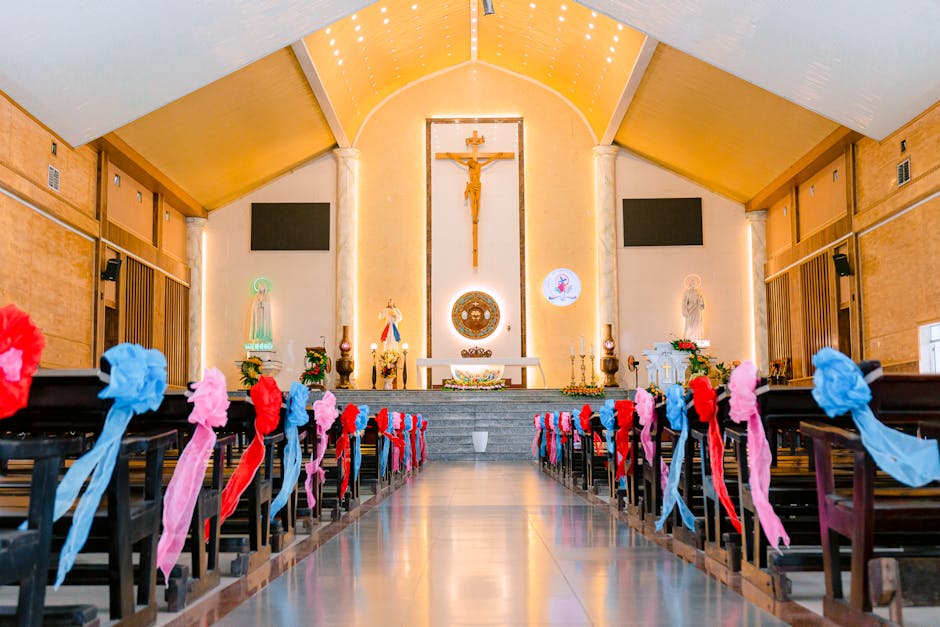A Blueprint for Faithful Communication
In an age of constant noise and sharp division, our Catholic faith provides a profound guide for engaging the world with clarity, charity, and an unwavering commitment to the common good.
The Unshakeable Foundation: Human Dignity
Our every interaction in the public square must begin and end with a fundamental truth: each person is created in the image and likeness of God. This is not a sentimental platitude; it is the bedrock of Christian anthropology and the starting point for all authentic dialogue. Before we formulate an argument, post a comment, or enter a debate, we must first see the face of Christ in the person before us, whether they are an ally or an adversary. This commitment to inherent dignity transforms our goal from winning a debate to fostering a genuine encounter.
This perspective challenges us to move beyond caricature and simplistic labels. It calls us to listen with the intent to understand, not merely to rebut. When we engage from this foundation, our presence becomes a testament to a different way of being in the world. In our families, it means honoring the voice of each member. In our parishes, it means welcoming the stranger. In our civic life, it means refusing to dehumanize those with whom we profoundly disagree. This is the difficult, patient work of building a culture of encounter, one conversation at a time.
He has told you, O man, what is good; and what does the LORD require of you but to do justice, and to love kindness, and to walk humbly with your God?
Micah 6:8
Prudence: The Art of Right Action
In the Catholic tradition, prudence is the “charioteer of the virtues.” It is the practical wisdom that guides our other virtues, ensuring they are applied rightly in specific situations. Prudence is not timidity or a refusal to speak the truth. Rather, it is the holy discernment that helps us know what to say, how to say it, when to say it, and when to remain silent. In a digital age that rewards instant, emotional reactions, the cultivation of prudence is a radical act of faith.
This virtue requires us to pause, pray, and reflect before we act. It asks: Will my words build up or tear down? Do I have a sufficient understanding of this issue to speak on it? Is my primary motivation a love for God and neighbor, or is it rooted in pride, anger, or a desire for affirmation? For a Catholic business owner, prudence might mean carefully crafting a marketing message that is both truthful and respectful. For a parent, it involves discerning how to discuss difficult topics with a child. For every Catholic, it means choosing to be a source of thoughtful reflection rather than another voice in a meaningless chorus of outrage.
Let your speech always be gracious, seasoned with salt, so that you may know how you ought to answer each person.
Colossians 4:6
Weaving Mercy and Justice Together
Modern discourse often presents a false choice between justice and mercy. We are told we must be either fierce advocates for truth or compassionate bearers of forgiveness. The Catholic faith rejects this opposition. Instead, it presents justice and mercy as two hands of the same loving Father. Justice is the necessary work of setting things right, of giving to each person their due, and of defending the vulnerable. Mercy is the overflowing, unmerited love of God that goes beyond the strict requirements of justice to heal, restore, and offer a new beginning.
Our public witness is incomplete if it lacks either. To speak of justice without a heart of mercy can lead to a harsh, self-righteous legalism that drives people away. To speak of mercy without a firm commitment to truth and justice can become a form of cheap grace that ignores sin and enables harm. The challenge for the faithful is to hold both in a creative tension. We are called to speak prophetically against injustice while always leaving the door open for reconciliation. We must work to correct wrongs while remembering that we, too, are sinners in constant need of God’s infinite mercy. This integrated approach is what allows us to be credible witnesses to the fullness of the Gospel.
Putting Principle into Practice
Translating these foundational ideas into daily habits is the essential work of a lived faith. The following table offers a framework for applying these principles in the various arenas of our lives, from the dinner table to the public square.
| Practice | Where to Apply | Why It Serves the Common Good | First Small Step |
|---|---|---|---|
| Attentive Listening | Family conversations, parish meetings, workplace discussions | It affirms the dignity of the other person and fosters mutual understanding, which is the basis of community. | In your next conversation, try to repeat back what you heard the other person say to ensure you understood them correctly. |
| Prudent Speech | Social media, professional emails, public comments | It prevents the spread of misinformation and calumny, lowering the temperature of public discourse and creating space for reason. | Wait one hour before posting anything online about a contentious topic. Pray before you post. |
| Seeking Common Ground | Civic engagement, ecumenical dialogue, neighborhood associations | It builds bridges and allows for collaboration on shared goals, reflecting the unity to which we are all called. | Identify one shared value or concern you have with someone you disagree with on other issues. |
| Balancing Truth with Mercy | Pastoral counseling, parenting, charitable work, fraternal correction | It upholds moral truth without crushing the spirit, offering a path to conversion and healing rather than condemnation. | When correcting a wrong, affirm the person’s inherent goodness first before addressing the problematic action. |
| Assuming Good Intent | Disagreements with colleagues, family members, or fellow parishioners | It disarms hostility and opens the door for productive dialogue instead of defensive posturing. | Before responding to a comment that rankles, ask a clarifying question to better understand the person’s perspective. |
An Examination for Public Witness
To cultivate these habits, it is helpful to regularly and prayerfully assess our own communication. Consider using the following points as a brief examination of conscience for how we engage with others:
- Did I pray before I spoke, wrote, or posted, asking the Holy Spirit for guidance?
- Did my words and actions honor the God-given dignity of everyone involved, especially those with whom I disagree?
- Did I seek to understand the position of another before I tried to make my own position understood?
- Was my contribution aimed at building up the Body of Christ and serving the common good, or was it aimed at serving my own ego?
- Did I speak the truth with charity, or did I use truth as a weapon?
- Did I offer a word of hope and mercy, or only a word of judgment?
We are not called to retreat from a complex and often-conflicted world, but to be a leaven within it. By consciously adopting a framework of engagement rooted in dignity, guided by prudence, and animated by a commitment to both mercy and justice, we can transform our presence in society. Our families, parishes, workplaces, and communities can become workshops of communion, places where the light of the Gospel shines clearly, offering not another source of division, but a credible sign of hope and a path toward authentic human flourishing.




